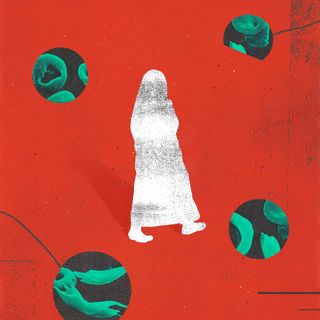
Pre-Menstrual Exacerbation Is Debilitating. Why Doesn't Anybody Know About It?
Often lumped together with PMS and PMDD, PME's invisibilization puts lives, careers at risk.

The week leading up to my periods has always been a sensory and emotional nightmare for me. My ADHD medicine doesn’t seem to help me focus nearly as well, and I feel like the antidepressants I take are siphoned off to some black hole outside my body.
When I finally opened up to my psychiatrist about the self-hate, suicidal ideation, anhedonia (the inability to experience pleasure), and the general sense of dysphoria that descends upon me for more than a week every month, he told me about PME (premenstrual exacerbation). PME essentially refers to when one’s existing psychological and physical conditions are worsened in the weeks leading up to their periods.
For years, I thought I was struggling with regular PMS (pre-menstrual syndrome), except, my experience felt a million times worse than those of others. Then, I learned about PMDD (pre-menstrual dysphoric disorder). But while the lived experiences of people with PMDD resonated deeply with me, unlike many of them, my symptoms didn’t disappear every time the bleeding began.
Aside from a lack of awareness about the condition, the existing stigmatization of mental health makes it even more challenging to get a PME diagnosis. “[M]any women who have PME haven’t recognized that they have a mood disorder. They may have undiagnosed depression, and seeking help for PME symptoms is often the way they get that diagnosis,” notes Dr. Lauren M. Osborne, a practitioner of obstetrics and gynecology at the New York-Presbyterian Hospital. “For women who do have a diagnosis and are using antidepressants, bumping up the dose during their premenstrual period [helps].”
Medical Gaslighting Impacts Women’s Health — But Self‑Advocacy Isn’t Always the Solution It’s Touted to Be
Anecdotal awareness of mental illnesses being intensified during the pre-menstruation stage has existed. Individuals with bipolar disorder experience a worsening of their usual symptoms right before their periods. Clinically depressed people, too, report more severe pre-menstrual symptoms – including suicidal thoughts – compared to those without a history of depression. Likewise, people with anxiety often witness a spike in their angst just before their periods begin. Yet, unlike PMDD – which was formally recognized in the latest edition of the Diagnostic and Statistical Manual published in 2013, after being under-researched for centuries – PME is still not recognized as a standalone, official diagnosis. In some parts of the world, it’s deemed as one of the many variants under the larger umbrella of pre-menstrual disorders.
“As I see it, the absence of a formal diagnosis places the burden of navigating everyday life, our relationships, and our careers on those of us who are doubly vulnerable due to the nature of our pre-existing conditions. Without one, obtaining reasonable adjustments – such as working from home, which allows me to release my emotions safely, instead of bottling them up and hiding my symptoms in public spaces – is tricky,” writes Evie Muir, who lives with PME. “My cocktail of pre-existing conditions includes BPD, C-PTSD, depression, and anxiety disorders which stem from childhood trauma, as well as domestic abuse trauma. For me, PME presents a monthly obstacle to overcoming my experiences and moving on with my life.”
PME can significantly impair the lives of people experiencing it; many encounter “increases in psychological distress and irritability, and decreased self-esteem,” in addition to “increased interpersonal conflicts and reduced social engagement.” In short, PME impacts many people's ability to earn a livelihood, while stripping them of the very desire to continue living. But since periods are still considered a “women’s problem” and medical science has routinely ignored women’s health, there’s an abject lack of targeted and specialized care for affected individuals.
Without formal recognition, even discourse on PME is dismally limited. This is perhaps why it took me so long to hear about it, despite writing about and researching women’s health as part of my job. Recalling her discovery of PME, a friend – and fellow autistic, ADHD writer – said, “It was like a lightbulb moment for me… Suddenly, it made sense why my PMS felt so much worse.” Having struggled with PME for close to 35 years, she learned about it while randomly browsing through an online community of neurodivergent individuals.
Is Delaying, Suppressing Periods Worth the Risk?
Unfortunately, even in the rare instance that PME is acknowledged, it’s often lumped together with PMS and PMDD – preventing people from understanding the subtle differences in their respective manifestations. “The difference between PMS, PMDD, and PME is often a different symptom quality… You can feel anxiety before your period with PMS or PMDD, but with PME, you’ll have a full panic attack,” explains Dr. Monica Rosen, an obstetrician-gynecologist from Michigan.
It is also critical for PME to have its own diagnosis and treatment options. “Several [trials] indicate that those with PME of depression don’t seem to respond well to some of our best treatments for PMDD… In addition, some of the later lines of treatment for PMDD (including chemical menopause and surgical menopause) are often effective for PMDD, but do not effectively treat the underlying disorder when it comes to PME. This is another reason why correct diagnosis is extremely important,” according to an article by the International Association for Premenstrual Disorders.
All this despite “women with PME [being] the largest group of women under the umbrella term of ‘premenstrual problems,’” according to Dr. Adwoa Danso, a family medicine consultant from the U.K. Unfortunately, large-scale data on PME to corroborate this is severely lacking. But one study – involving a significant cohort of 900 menstruating women in the U.S. – found evidence of PME in 60% of the depressed subjects, attesting to its prevalence.
Meanwhile, there is no dearth of memes and jokes about people being temperamental during “that time of the month,” simply because it seemingly impacts the lives of people around the menstruating individual.
The impact of PME on individuals’ lives, careers, and mental health is profound – debilitating even. Yet, its recognition and understanding remain painfully inadequate, which prevents people suffering from PME from receiving the care and accommodations necessary for navigating the challenges.
Devrupa Rakshit is an Associate Editor at The Swaddle. She is a lawyer by education, a poet by accident, a painter by shaukh, and autistic by birth. You can find her on Instagram @devruparakshit.
Related

.png?rect=0,80,1280,1280&w=320&h=320&fit=min&auto=format)
Why India’s Bid to ‘Decolonize’ Medicine With AYUSH Is Dangerous
